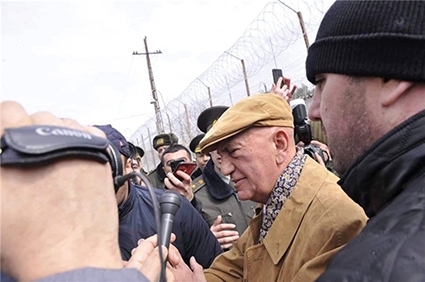Azerbaijan Releases 52 Political Prisoners for Novruz Amnesty
On March 17, President of Azerbaijan Ilham Aliyev pardoned almost 400 prisoners as part of an amnesty to mark the Novruz holiday. Various human rights organizations consider 52 of those released to be political prisoners.
It has become a tradition in Azerbaijan to pardon prisoners as part of the Novruz holiday celebrations. However, the number of political prisoners this year was much higher compared to previous years. Local human rights groups reported that only 12 political prisoners were pardoned during the last amnesty in May 2018.
Among those released are Giyas Ibrahimov, a youth activist who was sentenced to a 10 year term in 2016, two deputy chairpersons of the opposition People’s Front Party of Azerbaijan, youth group members who had been sentenced to 10 years in prison for graffiting a statue of the former Azerbaijani president Heydar Aliyev, journalists such as Fikret Faramazoglu, religious activists from the Naradaran Shia stronghold, and the former minister of health who has been in prison for 12 years.
The unprecedented mass pardoning is being interpreted in various ways. Some commentators believe that it follows internal and international pressure. Azerbaijan is negotiating a new comprehensive bilateral agreement with the European Union and upcoming negotiations are scheduled for April 4. The EU has pressured Azerbaijan to improve human rights in the country, including by releasing political prisoners.
The EU released a statement hailing the move a ‘welcome step’ whilst adding that it ‘expects further similar steps will follow in future, in line with Azerbaijan’s international commitments.’
Azerbaijan is in the grip of an economic crisis, growing public discontent and internal isolation which are forcing the government’s hand, states Arastun Orujlu, a political commentator. “The systematic crisis in Azerbaijan and social and economic tensions in the country have reached a peak,” he told Eurasianet.
However, government supporters deny claims that the government is weakening: “The President did not release the political prisoners because his power has weakened,” wrote Eynulla Fatyullayev, editor of the news website Haqqin. “On the contrary, his power is as strong as ever.”
Fatyullayev believes that the release of political prisoners is a victory over more conservative forces in the government and part of a “new course toward economic liberalization” implemented by Aliyev since the beginning of the year.
Nonetheless, the pardons have been criticized as skin-deep and not enough. The son of Eldar Sabiroghlu, a founding member of the ruling New Azerbaijan Party Rufat Safarov, who was released on March 17, told OC Media that although those who were freed are happy to be released, it’s not enough “because there are still political prisoners in jail.”
“In order to free the other political prisoners, society must continue an active struggle,” he continued.
A local human rights group the ‘Center for the Protection of Political Prisoners’ believes 137 people to still be imprisoned, whilst other groups estimate this number to be 127. Some commentators believe that the decision to release political prisoners will simply make way for new ones.
By Amy Jones
Image source: Musavat












